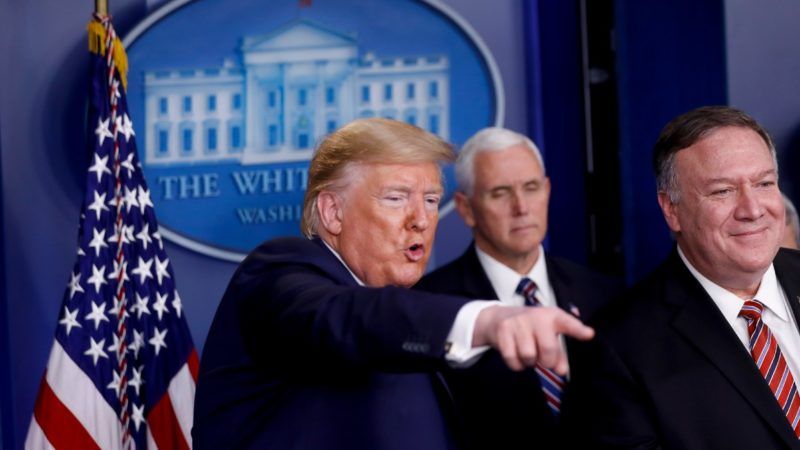Trump Should Forget Iran. America Has a Pandemic To Handle.
Keeping up maximum pressure is a dangerous distraction for the United States and catastrophic for the Iranian people.

The Trump administration's Iran policy has been business as usual since the spread of the novel coronavirus began, and that's a grave mistake. The president's tweet today warning Iran "or its proxies" against any "sneak attack on U.S. troops and/or assets in Iraq" is merely the latest example of misplaced priorities while a pandemic worsens in the U.S.
President Trump's "maximum pressure" approach to U.S.-Iran relations was counterproductive to our security and deleterious to diplomatic progress under ordinary conditions. Now, the United States and Iran are suffering two of the most severe COVID-19 outbreaks on the planet. Keeping up maximum pressure is a dangerous distraction for the United States and catastrophic for the Iranian people, whom Trump administration officials profess to support against their oppressive regime. Trump should abandon maximum pressure once and for all. It doesn't work; it will damage prospects of a free and democratic Iran for decades to come; and it's an unjustifiable distraction from vital U.S. interests in a time of pandemic.
The failure of maximum pressure was evident before the COVID-19 crisis started. After withdrawing from the Joint Comprehensive Plan of Action (JCPOA), commonly known as the Iran deal, the Trump administration re-imposed harsh sanctions the deal had lifted and deployed U.S. forces and ships (currently including two of our 11 aircraft carriers) as an unmistakable threat to Tehran.
The goal is to force Iran, as Secretary of State Mike Pompeo likes to put it, to behave like "a normal country." The entirely foreseeable effect has been exactly the opposite. Again and again it has incentivized escalation by a regime desperate to prove it will not be cowed. It has brought us closer to war, not peace. "Through a series of relatively limited but still dangerous military actions and incremental retreat from the terms of the JCPOA, Iran has signaled that it will not concede to the U.S. demands without a fight," explains MIT's Barry Posen at Boston Review. Maximum pressure is exacerbating Iran's regional troublemaking. It is making us less secure.
Posen suggests a thought experiment: What would we do were the United States under similar pressure from another nation—a nation which had, in the last two decades, invaded our near neighbors and conducted regime change operations and long-term occupations. "Given the intensity and religious elements of Iranian nationalism, the regime is unlikely to comply," he concludes, "and the Iranian people will likely support them, despite the regime's present domestic difficulties."
If ever there was a chance that U.S. sanctions could push the Iranian people to rebel against their government, as Pompeo hopes, COVID-19 has killed it. U.S. sanctions have compounded the effects of cruel and stupid pandemic response decisions by Tehran, severely impeding the Iranian medical response. Although Washington insists humanitarian goods are exempted from the sanctions, restrictions on financial institutions sharply curtail movement of desperately needed supplies. However angry ordinary Iranians may be at their government, this moment will create a lasting—and still avoidable!—antipathy for the United States and the values we tout if Trump does not change course.
The novel coronavirus pandemic adds a fresh urgency to the need for a new model of U.S.-Iran relations. Whatever trivial threat Iran could pose the U.S., we have more pressing concerns here at home (and so does Tehran, for that matter). Redoubling maximum pressure, as Trump and Pompeo have done in recent weeks, is a damaging and irrational distraction. The very last thing we need is continuing escalation toward another unnecessary Mideast war. It would be reckless, wasteful, and unstrategic in the best of times. It is inexcusable when we have a pandemic to handle.